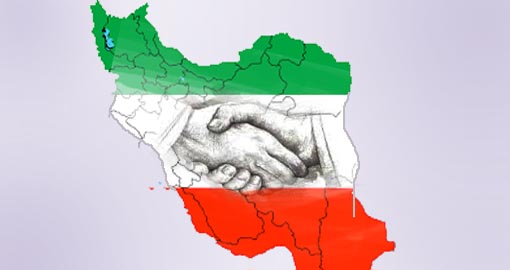Human society is dreaming the day that people will live together in peace regardless of their gender, ethnic, race, religious and national differences. Illuminated, open-minded people think of a society in which people value their most important common characteristic: humanity. Humanity is the basic notion for the qualities that make us human, such as the ability to love and have compassion, be creative, and not be a robot or alien. To achieve such ideals in a human society, one should trust those who actually practice the criteria of humanity not a destructive cult of personality like the Mujahedin Khalq with a dark history of violence and discrimination.

The Iranian nation includes a variety of ethnic minorities living in different parts of the country. This means that the Iranian territory has the potential capacity for separatist groups. As Mohammad Sahimi the Iranian-American professor suggests, the US and Israel alliance have founded their strategy on using this capacity to create what they call the “new Middle East”. They mostly succeeded to make this strategy work in Iraq, Syria and Lebanon but not in Iran.
“One approach that had been discussed for years and is now being seriously pursued is inciting ethnic unrest and creating puppet separatist groups or “liberation movements” in Iran’s provinces where ethnic groups other than Persians make up a significant portion of the population,” writes Sahimi. “They include Iran’s two Azerbaijan provinces, Kurdistan, and the oil-rich province of Khuzestan, where a small but significant part of the population is Iranian-Arab.” [1]
As it is known to everyone, the MKO is also one of the US-Israeli backed dissident groups to push Iran to turn into a client state. The MKO in its turn has so far cooperated with separatist group like Kurdish Pejak and now it is endeavoring to attract other separatists like Ahwazi Arabs. This year, the group annual gathering in Paris provided an opportunity for Ahwazi figures like Karim Abdian who might be so pleased to see Saudi Prince Turkie Faisal there calling for the fall of the Iranian government.
Karim Abdian announced his pleasure in an article published by Asharq Al-awsat. He writes about his experience of being in the list of MKO sponsors: “There appeared to be a drive to reach out to others in the Iranian opposition as well as Arab governments, in an effort to forge wider solidarity. Invited to attend for the first time, I headed a moderate Ahwazi Arab delegation as we sought to respond to the MEK’s offer to give our cause a fair hearing.” [2]
Abdian believes that the MKO is a reliable entity to unite with to form a federal state. As a matter of fact, federalism is the aim of certain separatists. Professor Sahimi asserts that in 2005, the American Enterprise Institute, the bastion of the neoconservatives, held a conference, “The Unknown Iran: Another Case for Federalism?” According to him the conference “, as usual, was attended by some who claim to represent a portion of the Iranian population. But the conference also provoked wide protests by Iranians.”[3]
While Karim Abdian resorts to the Cult of Rajavi as a trustable “non-Persian” opposition group, he indicates his ignorance about the current Mujahedin Khalq by recalling Ayatollah Taleqani as “the MEK’s ideological father”. He fails to know that Massoud Rajavi has been the absolute leader of the cult for at least the past 35 years. He counts on the MKO alliance saying, “In a positive move, Dr. Mohammad Mohaddessin, the head of MEK’s foreign relations, stated in recent interviews with Al-Arabiya and Alkhabriah that MEK seeks the same autonomy for the Kurdish, Arab, Baloch, Azeri, Turkmen and Lur regions as well.”[4]
The recent move by the MKO to embrace Arab states and Arab separatists is just another effort to find financial sponsors to replace Saddam Hussein. Adam Ereli, a lobbyist for Qatar and former U.S. Ambassador to Bahrain attended the MKO’s recent panel in Washington. He is an often-quoted critic of the Iran deal in the media and lobbyist for one of Iran’s biggest regional rivals, Qatar.”Over the past year, news outlets have consistently failed to disclose his work on behalf of Qatar when publishing his attacks on the White House’s nuclear diplomacy,” writes Eli Clifton of Lobelog. [5]
“Ereli wouldn’t be the first MEK-advocate with Sunni-Gulf ties to jump on the MEK’s bandwagon,” suggests Clifton. “Prince Turki bin Faisal al-Saud, the former head of the Saudi intelligence agency and longtime ambassador to the U.S., praised MEK leader Maryam Rajavi at the group’s annual gathering last July, in Paris. Prince Turki’s appearance, and his show of open support for the MEK, lends new credence to the rumors that the Sunni Gulf states are a possible source for the group’s mysterious funding.” [6]
Professor Sahimi accurately conclude that “the efforts to break Iran up will ultimately fail, as Iran has existed for thousands of years”. [7]Separatists and their allies particularly the Cult of Rajavi should know that Iranian nationality is one single identity that all ethnic minorities of Iran are living under it and brightened Iranians are those who seek a peaceful world together with all human beings of all races, religions and ethnic backgrounds. Mujahedin Khalq have indicated that humanity does not mean to them, what matters to the Rajavis is the survival of their cult of personality.
By Mazda parsi
Sources:
[1] Sahimi, Mohammad, Stop Supporting Separatist Groups in Iran, Antiwar.com, October 15, 2012
[2] Abdian, Karim, How the Iranian Opposition can Unite and Win?,Asharq Al-Awsat, September 4,2016
[3] Sahimi, Mohammad, Stop Supporting Separatist Groups in Iran, Antiwar.com, October 15, 2012
[4] Abdian, Karim, How the Iranian Opposition can Unite and Win?,Asharq Al-Awsat, September 4,2016
[5] Clifton, Eli, Congressional Research Service Expert and Gulf Lobbyist Headline MEK Event, LobeLog
August 31, 2016
[6] ibid
[7] Sahimi, Mohammad, Stop Supporting Separatist Groups in Iran, Antiwar.com, October 15, 2012

